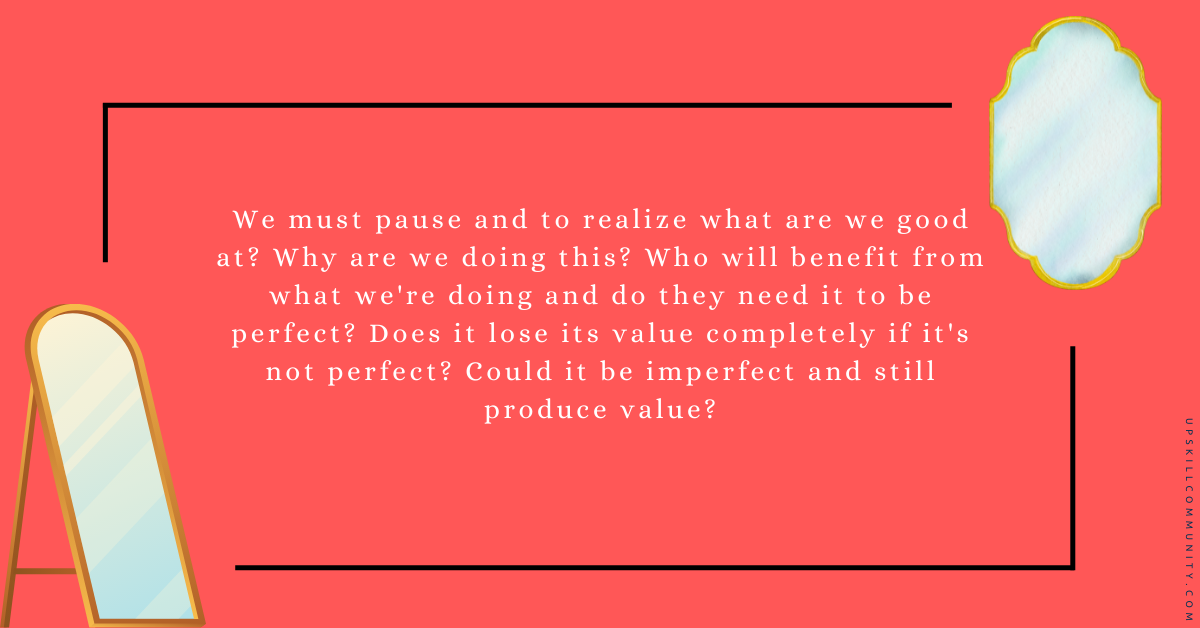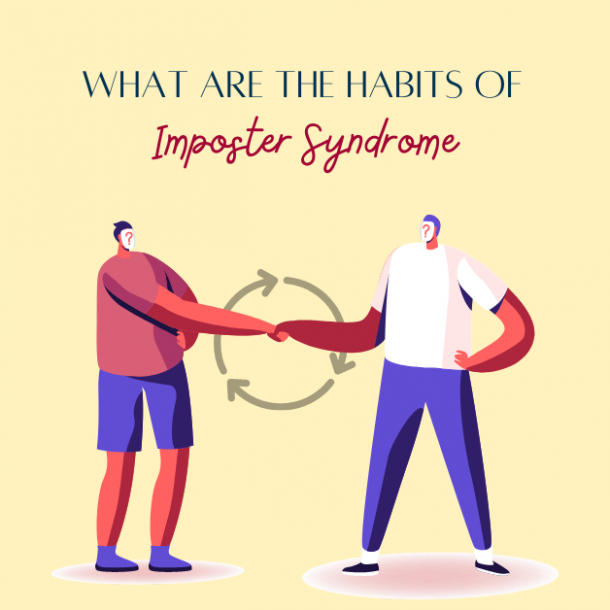
UpSkill: What does imposter syndrome look like?
In the previous blog post, I shared the story of Paul. Paul is a high-achieving professional with top-notch presentation skills. Yet his imposter syndrome, made him so anxious about presentations because he did not believe the overwhelmingly positive feedback he consistently received on his presentations.
Susan Albert of the Cleveland clinic defines imposter syndrome as the feeling that everyone else knows exactly what they’re doing, but you feel lost. You feel unsure? You feel undeserving? In this blog post, we take a look at what the imposter syndrome actually looks like and sounds like in our daily lives.
You are likely to experience imposter syndrome in some aspect of your life. You may not recognize it. You may have the feeling and not really know what imposter syndrome is, what it means and how it affects you and others you care about, or others you work with.
We are going to cover some characteristics of imposter syndrome, helping you to go through them and think about how they impact you.
If you identify something that relates to you, try to walk it back as much as possible.
If you are a high achiever one of the characteristics I am about to share in this episode likely impacts you.
1. It may look like over preparation, taking far more time to prepare for a meeting/presentation/event than those around you. It may mean taking way too much time to prepare. You also realize you take too much time.
There is proper preparation, there is under preparation, and there is over-preparation. That scale is one you want to be mindful of when you are thinking of imposter syndrome.
Are you giving something enough of your time? Under-preparing, over-preparing?
Under-preparation is for a different podcast. Proper preparation is where we want to be. Over preparation is a mark of imposter syndrome.
That is one thing that imposter syndrome may look like in your life. Check on yourself.
It doesn’t show up in every area of your life. Focus on the areas where you tend to be overpreparing.
Check carefully, because we want to make sure we are not providing fertile ground for an imposter to take over in our lives. We want to begin by disrupting where it is, so it doesn’t get comfortable and start to spread in our lives.
Another area where you may notice imposter syndrome showing up in your life is in overworking. This is very similar to over-preparation, but this goes to the actual effort that you put into what you’re doing on a daily basis. You could be overworking for many different reasons. Overworking to compensate for how you’re feeling. Overworking to impress others. Overworking to meet expectations, overworking to be noticed. Overworking just to be included. To feel like you belong.
The question you have to ask yourself is: Why do you feel the need to overwork? I actually posed that question to myself a while ago, because this is an area that I am working. So there’s working effectively. There is offering less than is required to work effectively, but there is certainly offering far more than is required to meet the standards set for you or those that you’ve set for yourself.
And so this overworking is something that we have to pause and examine. Take a look at how you’re working. Take a look at what’s required. Look at this scale, which goes from “very little effort to meet the standards,” to “appropriate effort, to meet the standards” to “far too much effort to meet the standards.” Think about that and think about the economic concept of diminishing marginal utility. Remember that at a certain point, you put in more effort and it actually does not yield outcomes that are proportional to that effort.
To what extent are you overworking? Why do you feel the need to do this? This is where we can identify the imposter seeping in. Then we can modify our work to be effective without overdoing it; without going beyond the point where it’s diminishing returns for our work. We can catch the imposter in that place and we can disrupt that imposter so that it does not continue to bleed all of our energy and effort.
One thing we need to think about is the relationship between the outcomes, the rewards, the results, and the amount of effort we put into our work. So think about when you’re putting in the appropriate amount of effort. What do you get?
And then, when you double that, how much more do you get? Do you get double the results, triple the results? At what point does the effort not produce any additional results for you? That is when you realize that you’re now in the zone where the imposter has showed up and he’s using up your energy and not giving you any rewards for that extra use. And that will actually help the imposter to build on itself. Because you’re going to be putting in more work and not getting more benefit, and you’ll begin to feel worse about yourself.
The third one is this group is perfectionism. Over preparation, overworking and perfectionism are all related to each other, but they show up in different ways. And so it’s important for us to take a look at all three individually. Perfectionism is a big one. It affects so many of us.
I was at the front of the line when they were given out perfectionism. In fact, I struggled with even publishing the podcast because it needed a lot more editing than I was able to give it. It’s so important that we recognize that we can produce value without being perfect.

In business, we talk about the MVP, the minimum viable product. I think perfectionists can look at this concept and use it to help us to gauge when we’ve hit the minimum viable product. Perhaps our minimum viable product is good to go for most other people.
People who suffer with perfectionism should ideally meet who can help them to recognize when the work is good enough to go. So we don’t burn ourselves out to make something marginally better with 10 times the effort. This is the challenge for people who suffer with perfectionism.
Did you realize that perfectionism was a symptom of the imposter syndrome? I certainly didn’t know that until I started researching imposter syndrome a few years ago. And so this is what I mean when I say we may very well suffer with the imposter syndrome, but not understand it very deeply. So we don’t realize the areas that it’s showing up in our lives. And so I want you to take a look at the over preparation, overworking and perfectionism. It may not show up at work. Maybe it’s when you’re hosting that party at home, maybe it’s with your children.
Think about where in your life is this showing up? Because if it’s showing up and we’re giving it fertile ground, it will seep into other areas of our lives. So let’s pause and look at these three areas. And think about the strategies that we can use to produce the results that we need to produce and provide no more effort, no more energy, no more stress than is required to get the job done.
Remember, imposter syndrome doesn’t show up everywhere you are, but wherever it shows up is an area that you want to be able to identify and remove the fertile ground where this imposter has the ability to grow. In the next blog post, I will continue with other ways that the imposter syndrome shows up so that together we can work at removing the imposter from our lives one characteristic at a time.



